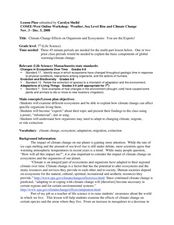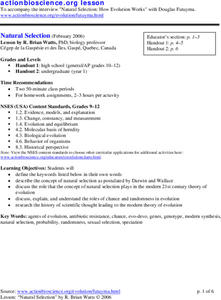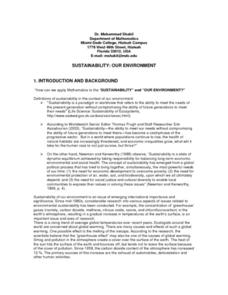Curated OER
Climate Watch
Students participate in a national survey of biological indicators of climate change by gathering and submitting data on local plants and animals.
Curated OER
Why do we need Vitamin C in our diet? Or Why do we carry old inactive genes in our genome?
Students explore and explain how mutations in the DNA sequence of a gene may be silent or result in phenotypic change in an organism and in its offspring. They analyze how evolution and biodiversity are the result of genetic changes that...
Curated OER
Population Growth
Students investigate the biodiversity of living things and how they are interdependent upon each other. They conduct research using a variety of resources. Specifically students create a graph to show how a population can grow in an...
Curated OER
Natural Puerto Rico
Students explore the nature of Puerto Rico. They view a Power Point presentation on world population and discuss how Puerto Rico landscape differs from Wisconsin's landscape. They create a Venn diagram comparing the two and complete a...
Curated OER
Maintaining Plant Genebanks
Students examine the use, costs, and the need for plant gene banks. The rationale for gaining ownership over scientific information and the implications of the developing nations' reliance on biotechnology is explored in this lesson plan.
Curated OER
Rainforest Rescue
Students explore threats to diversity in the Central African rainforest. They use a guided website to research animals that are threatened with extinction, examine human uses of the rainforest and think about what they can do to help...
Space Awareness
Ocean Acidification
Learn the science behind ocean acidification and its effects on ocean wildlife. Young scientists conduct a laboratory investigation that monitors the acidity level of water. While burning a candle, learners capture the carbon dioxide in...
Teach Engineering
Extinction Prevention via Engineering
It's time to save endangered species through engineering. The third lesson in a nine-part Life Science unit has young environmentalists study species extinction. An engaging discussion leads to some ideas on how to use engineering design...
Curated OER
Reflections on Earth: Exploring Planet Earth from Space
Students examine satellite images of Earth and contrast images at different scales. For this exploring Earth from space lesson plan, students use satellite images to contrast images at different scales, calculate distances from the scale...
Curated OER
A Frog's Life Story
Students investigate the lives of frogs by completing several worksheets. In this biology lesson, students discover the life cycle of a frog from tadpole to death. Students complete frog life cycle puzzle as well as create a...
Curated OER
The Census of Marine Life
Students explain diversity and abundance in marine life. In this oceanic biology lesson, students collect information for various geographical areas to collect a census of marine life.
Curated OER
Climate Change Effects on Organisms and Ecosystems: You are the Experts!
Seventh graders research about the effect of climate on different ecosystems. For this life science lesson, 7th graders present their research by creating a poster, infomercial, skit or song. They discuss how organisms adapt to climate...
Curated OER
The Good, The Bad, and the Arctic
Students investigate the social, economic and environmental consequences that might result from Arctic climate change. Students identify and discuss at least three consequences.
Curated OER
Paper Makers
Students make recycled paper out of scrap paper, water, and leaves. In this natural resources lesson plan, students learn about conservation of the forest and how we can use recycled paper to fuel our paper supply.
Curated OER
Arctic cleanup
Ninth graders examine pollution problems and how it affects the community. In this arctic cleanup lesson students study ocean currents and how they affect pollution.
Curated OER
Natural Selection
Students use discussion questions, handout information and research topics to explore several issues related to natural selection and evolution. They examine Darwin's research on the finch and antibiotic resistance.
Curated OER
Rainforests of Madagascar: Role Playing and Decision Making
High schoolers examine reasons for deforestation and become familiar with Madagascar and its culture, while describing biological and abiotic components of a rainforest, and looking at aspects that must be addressed to resolve the issue...
Curated OER
Preserving Paradise
Students read an online article to study about the death of Joan Root. They research endangered ecosystems around the world and design ad campaigns to create public awareness.
Curated OER
How Much Is An Ecosystem Worth?
Students explain and discuss the importance of ecosystems. They analyze the natural resources in the environment. They also suggest actions that would protect ecosystems.
Curated OER
Sustainability: Our Environment
Students explore the sustainability of our environment, the trend in rising temperatures and the emission of greenhouse cases. Using given data, students test and construct a confidence interval and the difference between two population...
Curated OER
Thinking About Science and the Environment
Students read 3 or 4 Science articles and complete a chart. In this scientific thought concept lesson, students play a game using their chart to reinforce their ideas and concepts. Students make a list of the bigger ideas...
Curated OER
Rain Forests: Sustainable Use
Students discuss their opinion on a teacher given scenario. In this chemistry lesson, students research the value of rainforests. They relate these ideas to current forestry practices.
Curated OER
Evolution: Adaptation
Tenth graders practice new skills and apply them. The skills of research should motivate them to want more knowledge. The concept of adaptation is used as a context for the lesson of practicing research skills.
Curated OER
Natural Inquirer
Students interview wildlife experts to gain information needed to research and write a report about an aquatic plant or animal affected by climate change.























